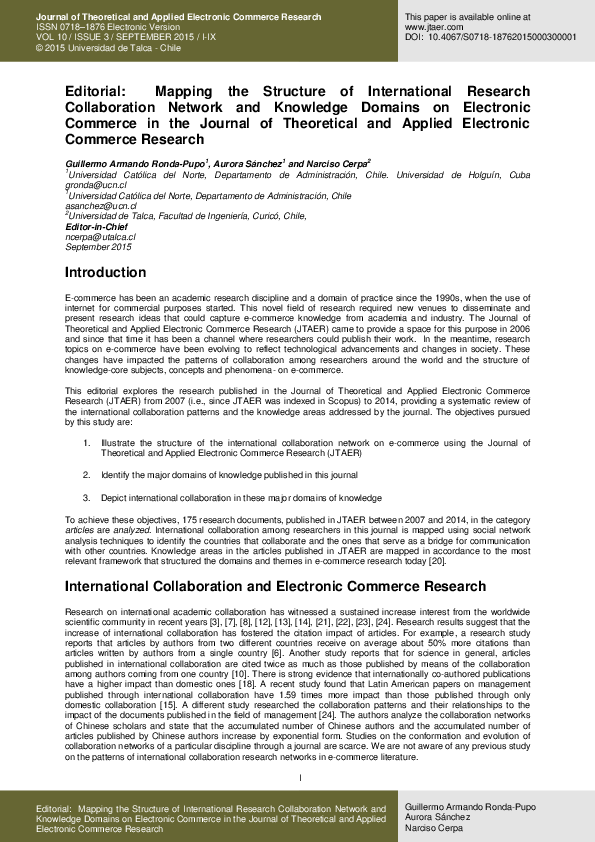基于雾计算的智能消费者推荐系统
IF 5.1
3区 管理学
Q1 BUSINESS
Journal of Theoretical and Applied Electronic Commerce Research
Pub Date : 2024-03-11
DOI:10.3390/jtaer19010032
引用次数: 0
摘要
将计算资源作为一种服务提供给管理者和消费者的最新努力,代表着从将计算作为一种购买的产品,转变为将计算作为一种从大型数据中心通过互联网提供给用户的服务。然而,随着基于云的物联网和人工智能(AI)的出现,它们正在许多应用领域(如推荐系统(RS))推进客户体验自动化,因此需要进行各种修改,以支持处于自动化世界中心的物联网设备,包括最近的语言模型(如 ChatGPT 和 Bard)和技术(如纳米技术)。本文将向营销界介绍最近的计算发展:物联网驱动的雾计算(FC)。尽管已有大量关于雾计算 "智能 "应用的研究成果发表,但迄今为止,还没有任何研究涉及基于雾的智能营销领域,如推荐系统。FC 被认为是一种新型计算系统,可为需要实时数据驱动决策的自主消费行为应用减少延迟并提高带宽利用率。本文为研究雾计算对消费者行为的影响提供了一个概念框架,目的是以 FC 和 RS 的交叉点为例,促进未来的研究。事实上,我们对 "基于雾的推荐系统 "的概念化为学术研究开辟了许多新颖而富有挑战性的途径,本文后半部分将重点介绍其中一些途径。本文章由计算机程序翻译,如有差异,请以英文原文为准。
Fog Computing-Based Smart Consumer Recommender Systems
The latest effort in delivering computing resources as a service to managers and consumers represents a shift away from computing as a product that is purchased, to computing as a service that is delivered to users over the internet from large-scale data centers. However, with the advent of the cloud-based IoT and artificial intelligence (AI), which are advancing customer experience automations in many application areas, such as recommender systems (RS), a need has arisen for various modifications to support the IoT devices that are at the center of the automation world, including recent language models like ChatGPT and Bard and technologies like nanotechnology. This paper introduces the marketing community to a recent computing development: IoT-driven fog computing (FC). Although numerous research studies have been published on FC “smart” applications, none hitherto have been conducted on fog-based smart marketing domains such as recommender systems. FC is considered a novel computational system, which can mitigate latency and improve bandwidth utilization for autonomous consumer behavior applications requiring real-time data-driven decision making. This paper provides a conceptual framework for studying the effects of fog computing on consumer behavior, with the goal of stimulating future research by using, as an example, the intersection of FC and RS. Indeed, our conceptualization of the “fog-based recommender systems” opens many novel and challenging avenues for academic research, some of which are highlighted in the later part of this paper.
求助全文
通过发布文献求助,成功后即可免费获取论文全文。
去求助
来源期刊
CiteScore
9.50
自引率
3.60%
发文量
67
期刊介绍:
The Journal of Theoretical and Applied Electronic Commerce Research (JTAER) has been created to allow researchers, academicians and other professionals an agile and flexible channel of communication in which to share and debate new ideas and emerging technologies concerned with this rapidly evolving field. Business practices, social, cultural and legal concerns, personal privacy and security, communications technologies, mobile connectivity are among the important elements of electronic commerce and are becoming ever more relevant in everyday life. JTAER will assist in extending and improving the use of electronic commerce for the benefit of our society.

 求助内容:
求助内容: 应助结果提醒方式:
应助结果提醒方式:


